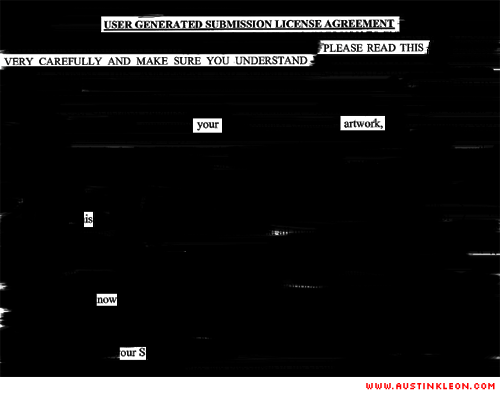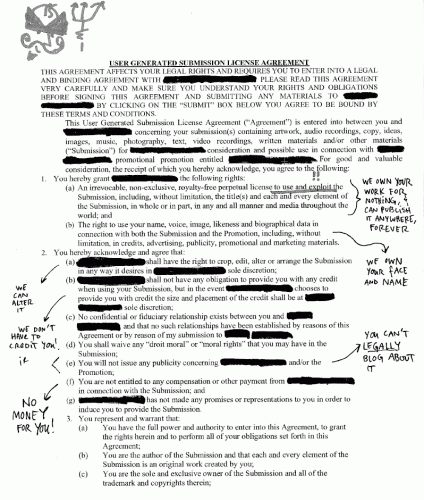
You get an e-mail from a marketing agency representing a product you use on a regular basis. They “love your work,” so they want to “share” it along with other product “enthusiasts” on a new “social marketing” website they’ve developed. They offer you a credit and a link.
Sounds good, right? Free publicity from a company whose products you already use?
Wrong. Check out the draconian user agreement they’ve attached:
Sorry, ______: I’ll still use your products, but I don’t sign the rights to my work and my face away without a big fat check. You want to feature my work on your blog? Ask for a Creative Commons commercial license, and then maybe we’ll talk. (See below)
Tiger Woods doesn’t endorse Nikes for free, so why should artists endorse art supplies for free?
Don’t let some corporation take advantage of you under the disguise of “social networking.”
UPDATE (6/15/2009): Google recently asked a group of well-known illustrators to submit art to be featured in their new web browser. The compensation? Exposure. Some good links:
NYTimes: Use Their Work Free? Some Artists Say No to Google
“You’d think that if anyone can afford to pay artists and designers it would be a company that is making millions of dollars,” Mr. Ciardiello said in an interview.
In the first quarter of this year alone, Google reported profits of $1.42 billion, an increase of 8 percent over the same period last year.
In a statement responding to questions, Google said that the project was modeled after a similar one last year for iGoogle, a personalized home page, where artists and companies (including Jeff Koons, Bob Dylan and Gucci) contributed images to be used as skins.
“While we don’t typically offer monetary compensation for these projects,” the statement said, “through the positive feedback that we have heard thus far we believe these projects provide a unique and exciting opportunity for artists to display their work in front of millions of people.”
But exposure often is a given for illustrators, who are rankled that Google is asking them to work for exposure alone.
“I have done gift cards for Target that are in stores nationwide and animations for Nickelodeon that run 24 hours a day worldwide on cable TV,” Melinda Beck, an illustrator who is based in Brooklyn, wrote in an e-mail message to Google rejecting its offer. “Both of these jobs were high-profile and gave my work great exposure but both clients still paid me.”
Mike Lynch: “Don’t Work For Exposure”
Keep moving — especially when a corporate giant like Google, that as we all know pays a decent wage to many of its employees like programmers, executives, media consultants, secretaries, etc., asks for your hard work for free.

I knew it was going to be a nasty story full of corporate sleaze and underhandedness when it began “You get an email from a marketing agency…”
Top work Mr Kleon. Bill Hicks would be proud. Even if they were to produce a check those conditions totally miss the point of what art is.
And that’s one awesome Devil.
“ask for a creative commons license?”
no one has tested this license in court. just stay away from CC altogether and ask for money. and don’t sign over your copyright. then you’ll be cool.
artists shouldn’t get all up in arms over these contracts. You have to learn how to respond to them. How to negotiate. How to assess things like “in perpetuity” and how to fix them. ARTISTS HAVE TO LEARN HOW TO ASSESS THE VALUE OF THEIR WORK.
Creative Commons just makes artists even more lazy when it comes to business then they already are. And it allows marketers to gain value, “non-commercial” value for free.
just buck up and negotiate. don’t balk at the first contract. it always sucks…counter with something awesome.
and leave CC in the magic fairy trashcan that it came from.
David, you are right: no reason to license your stuff CC to a major company for no money — but I think CC has its place for non-commercial bloggers.
Why artists should be up-in-arms is this: companies are pretending that they’re “simply blogging” this stuff on their website, when in actuality, the sneaky UGSLA they include in the communication gives them the right to reprint the work in any media in any manner for an indefinite period of time.
Someone with a little experience with this type of thing will know to look at the fine print, but someone young, hungry and dying for some publicity might give consent without looking.
And so, I put this up here for folks to be on the look-out. It’s a PSA. That’s all.
Austin,
Great post. Love your red lining!
Yes! Love it. I’ll never read an agreement like this without seeing this one again.